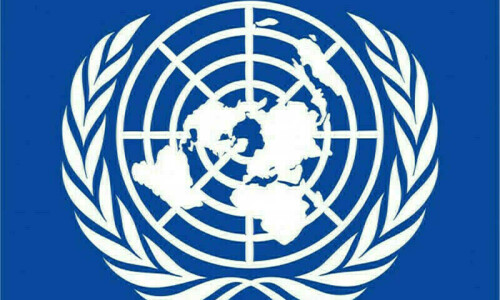WASHINGTON, May 6: The United States still regrets its decision in the 1990s to disengage itself from Pakistan and plans to stay engaged with a country it regards as too important to ignore, says a senior US official.
Deputy Secretary of State John Negroponte’s policy statement on Pakistan at a briefing in Washington on Monday underlined several areas of concerns but he backed every complaint with a strong expression of desire to further strengthen the relationship between the two countries.
“Before addressing how we plan to build our relationship with Pakistan’s new democratically elected government, I’d like to step back and consider Pakistan’s tremendous importance to the United States,” said Mr Negroponte while setting the agenda for the discussion.
“More than ever, our national security depends on the success, security, and stability of Pakistan. Pakistan is a vitally important nation,” he said.
“It is the world’s third most populous Muslim state. It is a nuclear power and it is situated in a strategically crucial neighbourhood of India, Iran, Afghanistan and China. And it is a front-line state in the battle against terrorism.”
Mr Negroponte criticised the first Bush administration for disengaging itself from Pakistan in the 1990s over Islamabad’s nuclear programme and offered an explicit acceptance of the country’s de facto nuclear status.
“The United States has accepted the fact that Pakistan has nuclear weapons,” said Mr Negroponte when asked if he believed Pakistan had overcome whatever problems it had with nuclear proliferation in the past.
“We certainly hope and work with your government to ensure that they are properly secured and we think it’s very important that things stay that way”.
Mr Negroponte recalled that for decades the US did not have a relationship with Pakistan which took in the whole panorama of US policy priorities.
“As a result, our relationship with this important country has not been as strategic as it could have been, and it has been more prone to being easily disrupted,” he noted.
“I believe it is necessary to build a comprehensive partnership not only with the Pakistani government but with the Pakistani people.”
He then made a statement that could be regarded as so far the strongest endorsement of the US’s relationship with Pakistan.
“We recognise that our fate -- that is, our security, our freedom, and prosperity -- is linked to the fate of the people of Pakistan,” he said.
“Enabling the Pakistani government to control its territory and to govern its people justly and humanely is a national security imperative for the US, an essential condition for success in Afghanistan, as well as the right thing to do.”
Tribal talks: Mr Negroponte, however, did not shy away from expressing US concerns over some recent developments, particularly the government’s decision to initiate a dialogue with tribal militants.
The United States, he said, was “concerned and sceptical” about these talks and wanted Pakistan to extend its authority over the country’s violent tribal regions as soon as possible.
“Let me be clear: we will not be satisfied until all the violent extremism emanating from the Fata is brought under control,” he said.
“It is unacceptable for extremists to use those areas to plan, train or execute attacks against Afghanistan, Pakistan, or the wider world.”
Democracy: Indicating a major change in the US attitude towards Pakistan, Mr Negroponte noted that after 9/11 Washington “personalised the characterisation” of Pakistan’s collaboration with the US by saying that President Musharraf was an indispensable ally in the war on terror.
“And I myself used that phrase on a number of occasions,” he said. “But it really is shorthand for the nation of Pakistan and it’s shorthand for saying that Pakistan is in an indispensable situation in terms of dealing with the threats we confront in the war on terror.”
The United States, he said, must pursue two overarching goals: first, the success of Pakistan’s transition to a stable, democratic Muslim state; and secondly, the empowerment of Pakistan’s government with the resources, capabilities, and the will to prevail against violent extremists.
“We cannot achieve these goals if we return to the tumultuous relationship of past decades. Our partnership must be long-term, substantial, and comprehensive,” he said.













































Dear visitor, the comments section is undergoing an overhaul and will return soon.